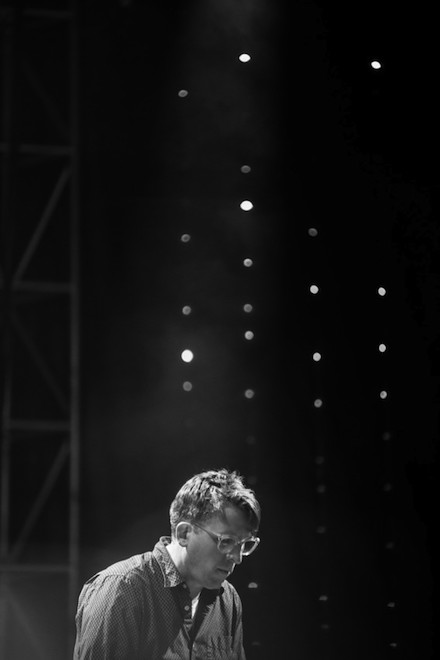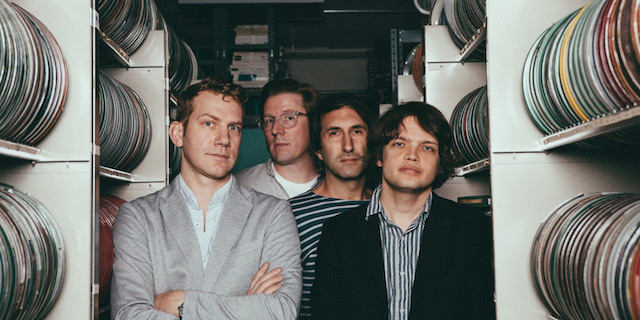(NORTH ADAMS, Mass.) – Mikael Jorgensen of Wilco teams up with art historian and curator James Merle Thomas (his partner in Quindar), performer and composer Nick Hallett, and guitarist William Tyler for a new project that blends Quindar’s intergalactic sonic waves with folk fingerpicking and found images from the archive of Los Angeles filmmaker Fred Engelberg, in the Hunter Center at MASS MoCA on Saturday, March 19, at 8pm.
Jorgensen, Thomas, Hallett, and Tyler, performing as The Trimbin Band, connect technical and music elements with selections from the Fred Engelberg film archive from the University of Southern California. Blending Tyler’s folk fingerpicking guitar stylings with Quindar’s electronic elements and Hallett’s eclectic compositions, the group scores and performs a series of new compositions to accompany “The Lost Films of Fred Engelberg (1929-2012).”
A Los Angeles-based filmmaker, musician, poet, and playwright, Fred Engelberg’s folk records, experimental films, and feature-length documentaries feature Los Angeles visual artists, 1960s counterculture, religious cults, and fringe activist groups — all reflecting the political and cultural complexities of the postwar American experience. Engelberg avoided the commercial realm of filmmaking and fell into relative obscurity; his many unreleased short and documentary films are now being restored and seen for the first time in nearly 40 years.
A filmmaker, folk musician, poet, and playwright whose artwork touched on many aspects of the American postwar experience, Fred Engelberg (1929–2012) was a counterculture figure who contributed to diverse art, film, and music communities in New York and Los Angeles during the 1960s and 1970s.
After releasing two Beat-inspired folk albums and relocating to LA in the early 1960s, Engelberg screened his short experimental films at the famous ‘Round Midnight Film Series, cavorted with Ferus Gallery artists, and regularly performed with Topanga Canyon folk singers at the legendary Unicorn Coffeehouse on Sunset Boulevard.
In addition to collaborating with filmmakers and cultural figures Les Blank, Simon Wiesenthal, and Shel Silverstein (among many others), Engelberg worked closely with Bert Schneider, Bob Rafelson, and Stephen Blauner, whose BBS production company (Easy Rider, Five Easy Pieces, The Last Picture Show) ushered in a new era of independent cinema in the early 1970s. Tasked with directing BBS’s documentary film division, Engelberg helped produce the Academy Award-winning film Hearts and Minds (1974) and completed, but never released, two feature-length films of his own.
During this period Engelberg’s experimental documentary films depicted the crisis in Vietnam, as well as domestic issues, including the civil rights movement, race riots, and protests led by university students and the Black Panthers, and explored fringe societal elements including American G.I.s seeking sanctuary in California’s convents, the Hell’s Angels and the Ku Klux Klan.
An artist whose principled aesthetic vision revealed the unrest — and poetics — of a nation in a period of dramatic transition, Engelberg and his diverse projects have remained until recently hidden from view, in part a consequence of his decision to relocate to the quiet of the southern California desert in the mid 1970s. Upon his death in 2012, Engelberg’s partner of over thirty years sought to place his life’s work with an institution that would assume the task of preserving and restoring his legacy.
The Trimbin Band — Nick Hallett, Mikael Jorgensen, James Merle Thomas, and William Tyler — works with the Hugh M. Hefner Moving Image Archive at the University of Southern California School of Cinematic Arts to review, select, and score excerpts from Engelberg’s motion picture and audio archives, now known as the Fred Engelberg Collection.
Drawing from the artist’s footage and his extensive personal reserves of found and stock film, the Trimbin Band composes and performs live musical accompaniment to Engelberg’s works, which have gone unseen for nearly forty years. Intended as part of a broader digital humanities project dedicated to the research and restoration of Engelberg’s materials, the Trimbin Band will premiere their project this March in New York as part of the 2016 Kaufman Music Center’s Ecstatic Music Festival, and at MASS MoCA.
Mikael Jorgensen is a Grammy Award-winning pianist, keyboardist, electronic musician, and producer. At SOMA Studios in Chicago, he engineered records for artists such as Stereolab, Rob Mazurek, The Aluminum Group, and Wilco. While engineering Wilco’s “A Ghost Is Born” in 2002, he began playing keyboards in the group, where he has remained for over a decade. Jorgensen has most recently released The Cheetah on Butterscotch Records with Chris Girard and long-term musical partner Greg O’Keeffe. In 2015, Jorgensen was in residency at MASS MoCA with Helado Negro’s Island Universe Story.
In Quindar, he performs with James Merle Thomas, an art history professor at the University of Southern California who researches the connections between postwar American avant-garde art and NASA. Thomas curated an exhibition at Stanford University in conjunction with the Robert Rauschenberg Foundation and has served as the Assistant Curator of the Second Biennial of Contemporary Art of Seville (2005) and the Seventh Gwangju Biennale (2008). “Part theory, part band,” Quindar combines rigorous historical research with musical performance. The duo selects archival materials (audio, film, design) and folds them into ambient, electronic, and experimental music. The project is named after Quindar tones, the ubiquitous transmission beeps heard during early manned spaceflight missions.
Nick Hallett is a composer, vocalist, and cultural producer whose work has been presented at the Whitney Museum of American Art, MoMA, the New Museum of Contemporary Art, The Kitchen, and Joe’s Pub, among others. In addition to his work on the Engelberg project, Hallett currently collaborates with choreographer Bill T. Jones as composer of the Bill T. Jones/ Arnie Zane Company’s three-part dance-theater work, Analogy: A Trilogy. In April 2010, Hallett premiered his first original opera Whispering Pines, co-authored with artist Shana Moulton, at The Kitchen in New York City, and it has since been staged at the New Museum of Contemporary Art, SFMOMA, Carolina Performing Arts, and other venues.
Nashville-native William Tyler is a masterful lo-fi guitar player who first came on the music scene when he joined the band Lambchop at the age of 19. Since then, he has played with the Silver Jews, Bonnie “Prince” Billy, Charlie Louvin, and Candi Staton. Known for both his acoustic and electric solo guitar playing, Tyler blends meditative guitar music pioneered by John Fahey and Jack Rose, with Nashville country, English folk stylings, and Southern California pop-folk-rock of the ‘70s. In 2010, Tyler released his first album under his own name, Behold the Spirit, which was lauded by Pitchfork as “the most vital, energized album by an American solo guitarist in a decade or more.” Tyler made his North Adams debut at Solid Sound in 2015, when he charmed the crowd with his quick fingers and cheerful banter.
The Trimbin Band dives into the historic Engelberg film archives on Saturday, March 19, at 8pm in MASS MoCA’s Hunter Center. Dinner is available from Lickety Split before the show. A full bar serves Berkshire Brewing Company beers and Berkshire Mountain Distillery spirits. Tickets are $8 students, $12 in advance, $18 day of, and $22 preferred. Tickets for all events are available through the MASS MoCA box office located on Marshall Street in North Adams, open 11am to 5pm every day except Tuesdays through spring 2016. Tickets can also be charged by phone by calling 413.662.2111 during box office hours or purchased online at MASS MoCA. All events are held rain or shine.
MASS MoCA is one of the world’s liveliest (and largest) centers for making and enjoying today’s most important art, music, dance, theater, film, and video. Hundreds of works of visual and performing art have been created on its 19th-century factory campus during fabrication and rehearsal residencies, making MASS MoCA among the most productive sites in the country for the creation and presentation of new art. More platform than box, MASS MoCA strives to bring to its audiences art experiences that are fresh, engaging, and transformative.
MASS MoCA’s galleries are open 11am to 5pm every day except Tuesdays. The Hall Art Foundation’s Anselm Kiefer exhibition is seasonal and reopens April 30, 2016. Gallery admission is $18 for adults, $16 for veterans and seniors, $12 for students, $8 for children 6 to 16, and free for children 5 and under. Members are admitted free year-round. For additional information, call 413.662.2111 x1 or visit MASS MoCA.


